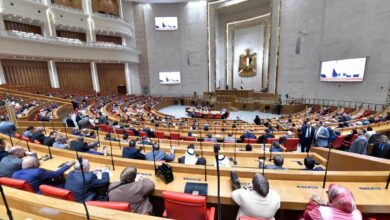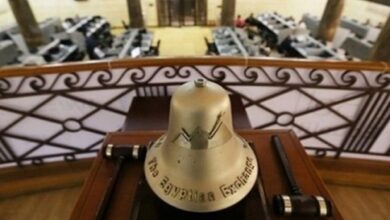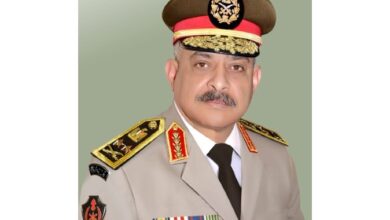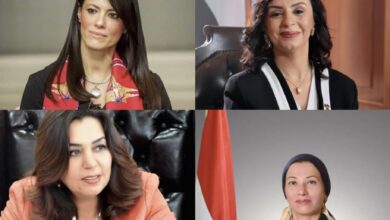The cabinet of recently-appointed Prime Minister Kamal al-Ganzouri was sworn in Wednesday, but many of the faces in the “new” cabinet are familiar officials promoted from within ministries in a move that some activists find at odds with Egypt's national interests.
The appointment of Mohamed Ibrahim as the new interior minister is a case in point. Before retiring in 2007, Ibrahim served as Giza's security chief from 2003 to 2006, and then as assistant interior minister for economic security. During his tenure as security chief, he was responsible for ordering Sudanese refugees ejected from Mohandiseen’s Mostafa Mahmoud Square, where they were protesting for asylum in European countries in 2005. At least 27 refugees including children were killed during the break-up.
Ibrahim denied any violations occurred during the operation in a phone call with Al-Hayat satellite channel on Wednesday.
A staunch defender of the ministry, Ibrahim's name was also linked to the torture of mini-bus driver Emad al-Kabeer inside Boulaq al-Dakrour police station in January 2006, an incident that provoked public ire at the time.
Ibrahim has strong ties with Ganzouri, who tapped him for the post.
“Mohamed Ibrahim was the mastermind of the murder of Sudanese refugees in 2005 and was an assistant to [former Interior Minister] Habib al-Adly and for us that is a red line,” says Abdel Rahman Samir of the 25 January Revolution Youth Coalition.
Activists' objections to Ibrahim's appointment come as part of a broader rejection of the Ganzouri cabinet. Ganzouri, who served as prime minister under former President Hosni Mubarak from 1996 to 1999, was appointed by the Supreme Council of the Armed Forces (SCAF) instead of the national salvation government many activists had agitated for. Egypt's rapid and unregulated privatization of state assets began during his tenure.
“We still object to the appointment of Ganzouri himself for his involvement in the shady privatization deals of 1999 and for appointing Gamal Mubarak to the Central Bank in 1997,” Samir says. “His choices for the cabinet are typical National Democratic Party (NDP) choices, despite the pledge he made to bring in more youth.”
Ganzouri had insisted when accepting the post that he would be given powers not granted to his predecessor Essam Sharaf, and before the swearing-in, the SCAF issued a decree amending the March constitutional declaration to grant Ganzouri the executive powers of the president except in matters pertaining to the armed forces and the judiciary.
Despite calls to scrap the ministry completely, Ganzouri appointed a new information minister, replacing Osama Heikal with Ahmed Anis. Anis was head of the Egyptian Radio and Television Union under Mubarak’s last Information Minister Anas al-Fiqqi, and was reportedly very close to Fiqqi. Previously, Anis, a former general, served as head of the military's morale department.
“I’m not against the post itself, but the information minister being a military man, it doesn’t augur well. I have nothing against him personally but it means tighter control and more propaganda by the SCAF,” says Shahira Amin, a presenter on state-run Nile TV. “I don’t know why they did this; they’re not even trying to appease the public.”
“It is hammering the last nail into the coffin of the revolution, because without a free media, there can be no democracy,” she adds.
Despite speculation that Ganzouri, who has prioritized fixing the economy, would keep the cabinet's finance portfolio for himself, he appointed Momtaz El-Said as finance minister. Said previously served as a deputy to former Finance Minister Hazem al-Beblawy and ministry representative on the Central Bank's board of directors. It is unclear whether he will continue to serve on the board.
Analysts say that Said has his work cut out for him.
“He has to tackle the budget deficit and increase foreign reserves and Suez Canal revenues, especially after the toll increase on the canal. He also needs to change the canal tariffs to dollars and not Egyptian pounds; this will help the Central Bank’s [foreign currency] reserves,” says Omar Darwish, assistant manager of Middle East/North Africa markets at the CIBC brokerage firm.
More importantly, Darwish says, Said “needs to work on properly allocating subsidies in the country. Factory owners get huge subsidies on electricity, for example, and many Egyptians living in poverty are paying for that.”
Some Mubarak-era ministers remain in place. International Cooperation and Planning Minister Fayza Abouelnaga has retained her position through yet another cabinet shuffle, as has Electricity Minister Hassan Younis. Also from the old guard is Housing and Urban Development Minister and former NDP member Mohamed Fathi al-Baradei. The ministers remaining from Sharaf's cabinet are Social Solidarity Minister Gouda Abdel Khaleq, Tourism Minister Mounir Fakhry Abdel Nour and Foreign Minister Mohamed Kamel Amr.
The new ministers in Ganzouri's cabinet include former EgyptAir Chairman Hussein Massoud as civil aviation minister, Mohamed Ismail as agriculture minister, Mohamed Ibrahim Aly as antiquities minister, Shaker Abdel Hamid as culture minister, and Hussein Moussa as higher education minister.




